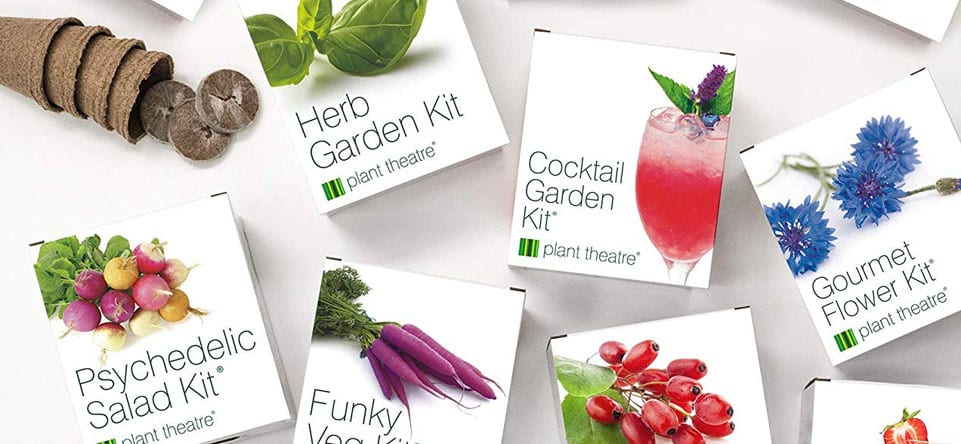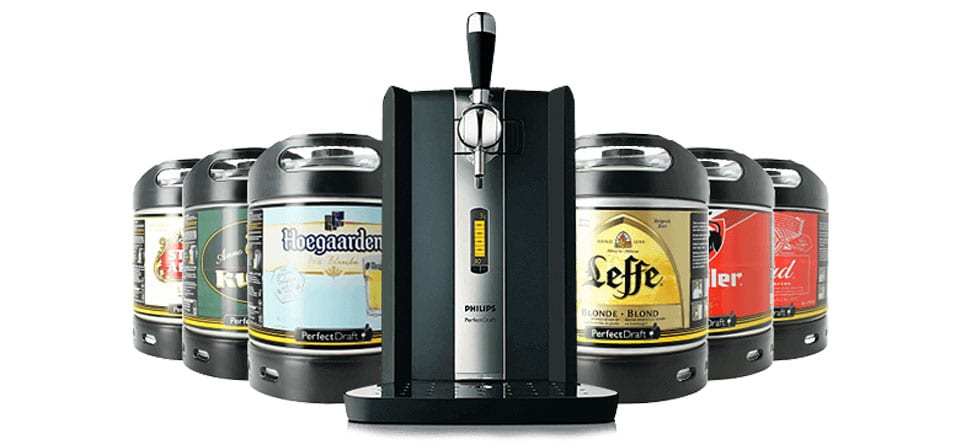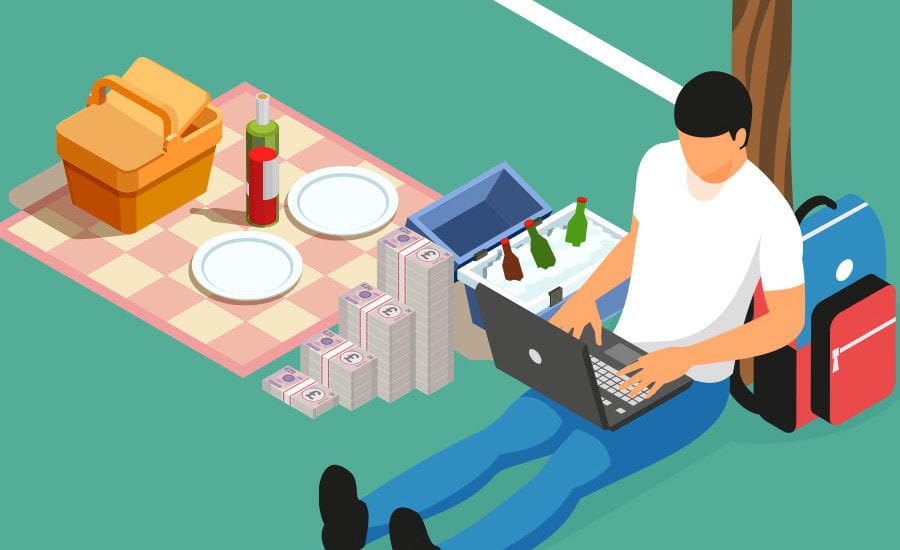Often when we discuss environmental impact/changes for daily living it’s all about cutting down, holding back or slightly inconveniencing yourself in return for a better future for your kids or grandkids, and whilst I’m sure we can all agree these changes are worthwhile it’s nice to learn about the other things you can do today that will actually improve your immediate life whilst also helping the planet!
1) See if you can work from home 1 or 2 days a week
(only if you drive a petrol/diesel car more than 4 miles to work each day, take a bus for more than 7 miles or 16 miles on a train)

If you can do your job from home one or more days a week this is a great way of cutting down your emissions whilst also benefiting from working from home (think cosy clothes, flexible schedule, easier to make calls, chuck the washing in, no office distractions etc), although there are some negatives so be careful you don’t fall into a rut of not working hard enough or simply going for ‘power naps’ that last 2-3 hours!
The Carbon Trust back in 2014 released a report 1 that went into far more detail on this but basically the study concluded that if you can walk, bike, rideshare or even drive under 4 miles to work you’re probably better of (environmentally wise) working from your actual office (as that’s already heated etc) but if you “drive 4 miles to work in the morning, take a bus for more than 7 miles, or travel by train for 16 miles or more” working from home will reduce your carbon footprint!
Ways to improve this:
- Only heat/cool the rooms you’re using during the day
- Keep warm with clothing layers and stay cool in summer with less layers
Other benefits:
- No need to buy expensive lunch out
- Fewer clothes to wash…
- Fewer clothes to buy…
- Less likely to print things for the sake of it or for showing off in a meeting etc
- Less likely to use one-time-use cups/cutlery etc
2) Moving to an all-electric car as your next vehicle
Electric cars sometimes get a bad rep but often it’s from people that have never actually driven one, we’ve owned electric cars for over 5 years now and whilst it’s not a completely perfect experience and will take a bit of getting used to, the benefits far outweigh the negatives from our experience and there is no ‘oh crap I need to go and fill up the car before Monday morning rush hour’ discussions at 6pm on a Sunday night!
The instance torque of all-electric cars makes them faster than 95% of other cars on the road (including many worth 5x the price) so they become more fun to drive, the lack of gears means for all other driving it’s a breeze and the instant torque referenced above far outweighs ‘the need for gears or a decent sounding exhaust’ that some seem to grip to as the only reason they couldn’t contemplate moving to an electric car.
It’s also been proven endlessly that electric cars are better for air quality, the environment and considering they cost less than 1/3 of the cost for the equivalent in petrol power, your bank balance as well over the lifetime of the vehicle! 2
Sure they’re not for everyone though and if you have an existing petrol car that works well and isn’t costing you a fortune in repair/maintenance bills it’s most likely better for you and the environment to continue to drive that but when the time comes to buy a new car an electric or plug-in hybrid should be the only ones you consider.
If you’re not considering a new car anytime soon you can also:
- Pumping up your tyres and ensuring you check them more often (this improves your economy and gives you more money in your bank)
- Use cruise control on long trips
- Empty your car of excess weight
- Consider carpooling
You may also find this article useful: What they don’t tell you when you buy an electric car
Fancy 1,000 free miles of supercharging in a new Tesla? Claim discount here
Fancy test driving an electric car for a weekend? Book from £75 for 4 or 7-day hire (or free 20 minutes)
3) Going into Nature and completing tasks to help it
 Research indicates that exposure to nature can increase self-esteem, happiness, vitality, mood, attention capacity, meaningfulness, mindfulness and cognitive anxiety, whilst also reducing depression, anxiety, hypertension, respiratory tract and cardiovascular illnesses.
Research indicates that exposure to nature can increase self-esteem, happiness, vitality, mood, attention capacity, meaningfulness, mindfulness and cognitive anxiety, whilst also reducing depression, anxiety, hypertension, respiratory tract and cardiovascular illnesses.
The study by the University of Derby and The Wildlife Trusts showed that “that there was a scientifically significant increase in people’s health, happiness, connection to nature and active nature behaviours, such as feeding the birds and planting flowers for bees – not just throughout the challenge, but sustained for months after the challenge had been completed.” 3
Everyone knows that increasing your exercise levels helps with staying healthy but if it also helps you cut down on travel emissions that’s no bad thing either, if possible considering walking/cycling to work once or twice per week if you normally drive or getting off one stop early on the tube/train/tram etc to walk the rest home. Many people can kill two birds with one stone by doing this, as they can cancel/lower their gym membership because they’re now exercising more, also walking to the shops will ensure you only ever buy what you can carry home!
Things to do:
- Read the BBC page
- Read Mental Health and the Environment
- Litter pick
- Go for walks/picnics etc whilst ensuring you take all your rubbish with you
- Eat your lunch in the park instead of at your desk
- Increase the amount of walking, cycling or public transport use
- Start Geocaching for a cheap/free way to keep adults or kids entertained whilst also exercising
- Read the NHS guide on walking
- Help record butterflies via an app
4) Moving to metal capsules for DIY coffee refills + finding your local coffee pod recycling centre to help raise money for charity
 If you have a coffee machine that takes capsules you may have realised that there is a lot of waste generated, however, there are some useful gadgets that will allow you to refill these capsules to improve the coffee options whilst also potentially saving money in the long run, that said if you’re a real coffee lover you might be better off trying to flog your capsule coffee machine and instead buying a bean to cup machine instead and then fill it with coffee beans direct from the bag.
If you have a coffee machine that takes capsules you may have realised that there is a lot of waste generated, however, there are some useful gadgets that will allow you to refill these capsules to improve the coffee options whilst also potentially saving money in the long run, that said if you’re a real coffee lover you might be better off trying to flog your capsule coffee machine and instead buying a bean to cup machine instead and then fill it with coffee beans direct from the bag.
Nespresso
It’s possible to use a reusable metal container instead of the plastic disposable ones, however, there isn’t much choice and reviews indicate they won’t work with all machines but Amazon will allow returns if you have problems, either way check the reviews.
SealPod Nespresso Reusable Capsules or Nespresso Reusable Capsules (selected machines only)
Tassimo
Sadly whilst it’s possible to refill them, the process is flawed and simply takes far too long to be functional, the best advice is to continue to use and use one of the recycling locations listed here.
Where can I recycle my coffee pods?
Other products you can recycle + help charities at the same time:
- Ella Kitchen Pouches and Snack packets
- Hovis Bread Bags
- Carex
- Walkers Crisp Packets + This additional non Walkers one + Tayto
- Chocolate Bags
- Colgate
- Febreeze
- Flash Wipes
- Garnier
- Jacobs / McVities etc
- Pet Food Packaging
- Pens
- Loads more
5) Learn about what’s going on with our planet and consider trying to go Vegan/Veggy (even if it’s just half of the week/meals)
With documentaries like ‘The Game Changers’ on Netflix showcasing how vegan athletes have become superior to their meat-eating equivalents and films like Racing Extinction showcasing how “…Two worlds drive extinction across the globe, potentially resulting in the loss of half of all species.” it’s becoming pretty clear that reducing our animal reliance for food whilst truly understanding what is happening in the world is a positive chang for us all.
The amount of decent vegan/veggie food is now getting to the point that it’s pretty difficult to have a bad meal and that’s coming from a previously big meat eater, yesterday I ate a vegan sausage roll and honestly I had to double-check it wasn’t actually meat!
- Buy Racing Extinction on Amazon, Google Play or YouTube
- Watch ‘The Game Changers’ on Netflix
- Buy ‘the highest-selling vegan cookery book’ ever
- Spend less by buying fruit and veg that is in season
- Here’s Everything You Need To Know About Becoming Vegan in 2018
- 20 Cheap Yet Tasty Vegan Meals
- Learn the common climate crisis questions and answers
- Try to shop locally & organically.
6) Grow your own superior food at home

Having your own blooms of lettuce, rich orange carrots or fruit hanging from your own trees will cut down your supermarket bills, reduce your food waste and help your garden flourish but it’s important to remember that what we eat determines how we think, behave and act so improving what we eat is vital for better physical and mental health.
Consider watching YouTube shows from the likes of B&Q, BubbleBeet & Learn Organic Gardening to better understand what you need to be doing.
Buy:
- Funky Veg Kits – idiot-proof growing kits
- Self-watering pots – idiot-proof pots
- Buy a VegTrug – idiot-proof outdoor veg boxes
- Buy 80 litres of compost (delivered) – decent compost
- Buy Vegetable Seeds / Compost etc
You may also enjoy reading ‘Food for thought – Mental Health Nutrition Briefing‘
7) Buy decent/thick/high-quality wrapping paper and then reuse it
 OK so this only really works when giving gifts to others in your household unless you want to look a bit odd by asking for your wrapping paper back from those you’ve just given a gift to, but basically 4 years ago we purchased some high-quality Wrendale wrapping paper at £1.75 per sheet (or check John Lewis for similar) and since then have taken care of if when unwrapping and only used Magic Tape that we purchased in 2014 which doesn’t remove the print when you peel it off etc.
OK so this only really works when giving gifts to others in your household unless you want to look a bit odd by asking for your wrapping paper back from those you’ve just given a gift to, but basically 4 years ago we purchased some high-quality Wrendale wrapping paper at £1.75 per sheet (or check John Lewis for similar) and since then have taken care of if when unwrapping and only used Magic Tape that we purchased in 2014 which doesn’t remove the print when you peel it off etc.
It sounds a bit dramatic when I write this but it looks and feels great compared to the cheap stuff you buy at ~£3 per 10M roll and the fact we will get probably 5 years of use out of it is great for the environment as well.
Alternatively, you could make bookmarks, name labels etc out of the same paper by wrapping it around card and glueing it down etc.
8) Drink beer as it was originally intended instead of in gassy bottles/cans
 Beer bottles/cans are good for numerous reasons (especially cost) but they are generally quite gassy, they generally get chucked in recycling bins instead of getting reused and the taste is generally inferior to proper kegged/tapped beer, so we recently moved to a beer system that uses 6-litre kegs, once empty these are then returned in bulk (by free courier or in person) to be cleaned and refilled for the next customer, it’s probably on the fence environmental impact wise considering we end up returning the kegs via courier most of the time but now our neighbours don’t have to know we have a drinking problem when they walk past our recycling bins (joke, always drink responsibly) but considering the beer tastes much better than bottles/cans it’s been extremely worthwhile. Of course, you could just stop drinking alcohol altogether, this would see the most environmental impact and is what the trend for over 25% of those aged 18-24 now is, alternatively move to alcohol-free or low alcohol alternatives.
Beer bottles/cans are good for numerous reasons (especially cost) but they are generally quite gassy, they generally get chucked in recycling bins instead of getting reused and the taste is generally inferior to proper kegged/tapped beer, so we recently moved to a beer system that uses 6-litre kegs, once empty these are then returned in bulk (by free courier or in person) to be cleaned and refilled for the next customer, it’s probably on the fence environmental impact wise considering we end up returning the kegs via courier most of the time but now our neighbours don’t have to know we have a drinking problem when they walk past our recycling bins (joke, always drink responsibly) but considering the beer tastes much better than bottles/cans it’s been extremely worthwhile. Of course, you could just stop drinking alcohol altogether, this would see the most environmental impact and is what the trend for over 25% of those aged 18-24 now is, alternatively move to alcohol-free or low alcohol alternatives.
There are a few of these types of units out there but the best from our research is the Philips Perfect Draft system which retails for around £250 but you sometimes get a free keg included in that (worth about £35-£37) and if you combine that with a 10% off referral discount code it drops down £215.10 delivered + you get £5 in credit when you return each keg.
They also sell these combos which work out cheaper:
- Leffe Christmas Bundle £199 (or £179 with code above)
- Jaipur Starter Bundle £199 (or £179 with code above)
- Tiny Rebel Starter Bundle £199 (or £179 with code above)
- Stella Artois Starter Bundle £199 (or £179 with code above)
We’ve put this handy spreadsheet together to show how to save the most money on the kegs and machines whilst also showing the cost per pint values for all the 37+ available beers.
For additional improvements:
- Ensure you keep the packaging the original kegs come in, these can then be reused to send the empties back
- Return the kegs in bulk to lower the impact of the parcel
- Considering finding a local supplier instead if one is available
- Whilst the beer is good for 30 days once opened and installed in the machine, you can extend this time to the BBE date by removing from the machine, removing the tap and putting in the fridge.
- Keep and reuse the included rubber tubes that come with each keg
- Use a nucleated glass to make sure your beers keep their fizz
9) Swap your batteries to reusable ones and if you have non-reusable ones make sure you properly dispose of them
 This has been a common tip for many years at 10ways but it’s an important one as every year, approximately 800,000 tons of automotive 12V batteries, 190,000 tons of industrial batteries, and 160,000 tons of consumer batteries enter the European Union 4 but sadly not all of them are properly collected and recycled when they’ve stopped being useful so many end up in landfill or worse!
This has been a common tip for many years at 10ways but it’s an important one as every year, approximately 800,000 tons of automotive 12V batteries, 190,000 tons of industrial batteries, and 160,000 tons of consumer batteries enter the European Union 4 but sadly not all of them are properly collected and recycled when they’ve stopped being useful so many end up in landfill or worse!
For consumer batteries, there is a great alternative, rechargeable ones, the main benefit of this is that there is no need to ‘pop to the shops’ to buy some batteries when a new product/toy arrives or start removing them from other devices in an ‘oh crap, I thought it would come with batteries emergency’ but there are other benefits including better performance, time savings, and financial benefits, read this guide if you’re interested in learning how we saved over £600 over 5 years by buying rechargeable batteries or failing that just buy these and this and you will be on to a winner!
Other things you can do:
- Request a battery recycling box for your business
- Search your local council website for information on how to recycle old batteries
10) When your lightbulbs stop working buy smart LED lightbulbs to replace them
 If you’re still using traditional light bulbs you can make a great step for the environment by moving to LEDs but moving to smart LED lightbulbs like Philips Hue instead is not only better for the environment longterm it also improves your day to day life.
If you’re still using traditional light bulbs you can make a great step for the environment by moving to LEDs but moving to smart LED lightbulbs like Philips Hue instead is not only better for the environment longterm it also improves your day to day life.
You will need:
- A starter kit or Hue Hub
- A lightbulb to replace each major bulb in your house (from ~£12 per bulb), although we suggest starting off with some key rooms like your hallway, front door, kitchen and lounge first. It’s often cheaper to buy 3 packs, also consider comparing prices on AO, John Lewis & Amazon
- 1 or 2 Hue motion sensors (the ‘hidden’ secret of a decent Hue setup) for each room
- 1 or 2 Hue Switches for the house
If you’re looking at a cheaper option consider TP-Link, IKEA or
Other benefits:
- Lights can be controlled by voice (Alexa / Google / Siri)
- Lights can mimic you being home when you’re away to reduce the chances of a break-in
- Hue Bulbs use LED technology
- Colours of Hue Bulbs can help with concentration when working or helping to relax at night
- Use your lights to alert you to things like Smoke / When your favourite team scores a goal etc etc




























